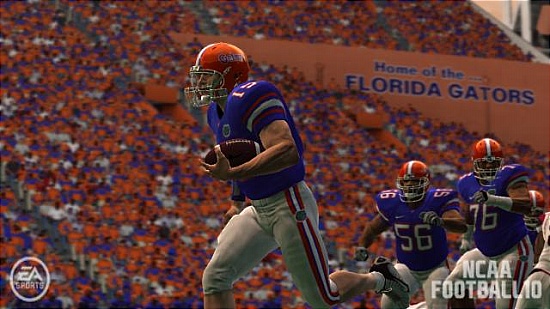NCAA Football 10 Included Tim Tebow’s Name; Could Impact Player Likeness Lawsuit

Though EA may still be attempting to argue that players in NCAA video games don’t exactly represent the likenesses of the real athletes (they even filed a study that only about 15% of in-game characters match height, weight, home state, and position) ultimately that will be a tough sell to a jury in the monumental lawsuit ahead. Instead what they have been producing being protected as artistic works appeared to be the far stronger point to be made but the hits keep on coming for the NCAA, CLC, and EA who appear to be in big trouble.
A post on SBNation with the info and image coming from a reader details how Tim Tebow’s name actually appeared in NCAA Football 10. An entire formation was based on Tim Tebow – Shotgun Twin QB Tebow. This completely undermines EA’s declarations that they don’t use names or base players on their real life counterparts.
Displaying that a formation and plays were designed with particular athletes in mind could be a smoking gun that the three defendants went too far in profiting off likenesses that may, or may not, be protected under the First Amendment. That argument however recently hit a snag as noted yesterday. Given that much of the basis of their defense regarding video games has been that player names have never been used this could end up being a crucial development if it gets entered into evidence.
Earlier/Summary Below
The player likeness lawsuit against the NCAA, CLC, and Electronic Arts is the culmination of two high profile filings that were combined as led by Sam Keller and Ed O’Bannon (and O’Bannon now heads it up). It alleges improper use of player likeness through various forms of merchandise and media including video games in which the parties in question conspired to avoid paying players for their rights. Some interesting details and claims regarding the case at hand were revealed when EA was reentered as a defendant after initially being dismissed.
EA has won a previous case regarding player likeness with the courts ruling video games are artistic works rather than commercial speech and therefore protected by the First Amendment. The Supreme Court in 2011 established forms of media, producing expressive works of art, are not subject to judgments based on incorporating someone’s name or likeness. One dismissed case however, involving Ryan Hart, has resurfaced after an appeals court reversed a decision based on that argument.
Recent uncovered emails have shown that NCAA representatives were well aware that players in games were based off real-life players. At one point the NCAA and EA had nearly reached an agreement to have actual player names included in the products. The EA Locker / Roster Share feature was a fallback option. With momentum clearly on the plantiffs’ side NCAA reps have begun to publicly express concern over the future of collegiate sports. A former EA Sports producer admitted players in NCAA games were based off real athletes.
This consolidated case in California looks as though it will be going to trial and ultimately be the determining factor of how the NCAA proceeds in the future handling broadcasting rights, merchandising, and video games. Should a negative result come down, which one analyst has pegged as being a potential loss of $1 billion for EA, it would likely not just end the NCAA Football series but also with it any realistic possibility of college sports games being made in the future. The NCAA is currently seeking to block classification as class action. The trial now is slated to begin June 2014. Appeals following a decision could extend the fight through 2020.
